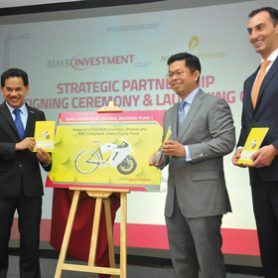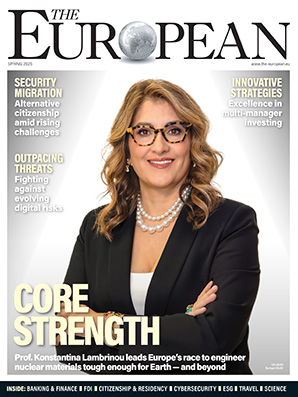With a growth rate averaging between 10% and 20% in the last decade, Islamic finance’s significance has risen markedly, especially in its ability to meet modern economic requirements. Indeed, it is one of the fastest growing segments of the global financial industry, from $200bn in 2003 to an estimated $1.8tn in 2015, with global assets expected to surpass $3tn by 2020. Global financial players in fact have included Islamic finance as part of their growth strategies, denoting greater recognition of its value propositions.
More importantly is that Islamic finance is seen as the embodiment of a socially responsible investment philosophy. Its main tenets are virtues that uphold social justice, equality and inclusive economic growth. In other words, Islamic finance resonates well with the idea of sustainable development.
At Bank Islam, placing importance on its contribution to society and the wider economy are the principles that have driven the bank thus far. Established in 1983, it’s a pioneer among Shariah-based banking institutions in Malaysia and Southeast Asia and plays a leading role in the development of the nation’s Islamic banking industry.
“Bank Islam strives to emulate Islamic principles in every aspect of its operations and intends to continue building a sustainable and responsible financial institution. Our past initiatives for the benefit of the communities in which we operate speak volumes,” says Dato’ Sri Zukri Samat, Managing Director of Bank Islam.
Bank Islam, for example, acknowledges the rising demand for socially responsible investments (SRI). For many investors, SRI is now a guiding principle where investors are guided by an ethical or moral code for environmental, social and governance (ESG) investments. Studies have also shown that SRI and Islamic finance reflect each other in their socially responsible objectives and the exclusion of businesses deemed unethical. Led by a new generation of investors, the concept of sustainability takes centre stage and Bank Islam through its 100% subsidiary, BIMB Invest has been partnering with a global asset-management firm in 2015, to introduce Malaysia’s first multi currency Shariah and ESG-compliant global equity fund. “My view is ethics should be the centre of everything that we do. This can lead to sustainability,” Zukri added.
Reaching out
Another focal point for Bank Islam is promoting financial inclusion. An iconic traditional market in the Kelantan (East Coast state in Malaysia) became the first to accept electronic payments through mobile point-of-sales (mPOS) in 2013. It was Malaysia’s low cost payment terminal initiative that enables Malaysian SMEs and micro enterprises to accept electronic payments. This also brings the bank a step closer towards the government’s objective of making Malaysia a cashless society.
One more initiative of giving back to society is promoting charity and donations. Bank Islam realised that many people are prepared to donate to charity in order to help those in need, but often remain unaware of the channels through which they can give. Hence, there is constantly a need to find new ways of facilitating donations to society’s most in need. Therefore in 2016, Bank Islam launched an innovative product and the first in the country, the ‘e-Donation’ Terminal using Visa PayWave’, which is a platform whereby donations can be made through the contactless electronic method using any debit/credit Card with payWave feature. Several ‘e-Donation’ terminals have been installed at several mosques throughout Malaysia, which can be utilised by the mosques’ congregation, as their donations can be made quickly and easily. Ensuring that the mosques are provided with the terminals for free, with no transactional charges applied to either the mosques or the donors is symbolic of the bank’s corporate responsibility initiatives. It also helps to eliminate cash management processes and reduce the risk of petty thefts at the mosque.
Bank Islam recognises that a distinct brand for its corporate responsibility (CR) is as important as the activities themselves. This has led to the inception of the ‘AMAL’ brand name to expand the social impact of its CR initiatives. Under AMAL (meaning, good deeds or actions in Arabic), the bank’s flagship CR initiative Housing Aid Project for society’s poorest has been ongoing since 2008 and aims to assist impoverished families by providing them with comfortable homes and the basic needs of every human being. Since its inception, more than RM6.3m (approximately $1.37m) has been channeled to this project, making it possible for 237 marginalised families across the country to own a house.
Bank Islam also believes that every child should be given equal opportunity to get the education that he or she deserves, especially those from underprivileged families and communities. In its effort to level the playing field between urban and rural children, Bank Islam has affiliated with Promoting Intelligence, Nurturing Talent & Advocating Responsibility (PINTAR) Foundation in its School Adoption Programme. Since its involvement with the programme in 2008, the bank has adopted 20 schools all across the country, assisting the Foundation to educate and impart useful skills to more than 15,000 primary school students nationwide. This programme is designed to foster academic as well as non-academic excellence in underserved communities and to help bridge the urban-rural divide.
Since 2015, Bank Islam’s collaboration with PetroSains (a subsidiary of Petronas, Malaysia’s oil and gas multinational) represents another path for the bank to drive its commitment to education enhancement initiatives especially among schoolchildren. The primary focus under this initiative is science education, which is vital in advancing the society’s development. The collaboration includes a nationwide school tour via series of workshops conducted at various schools to encourage students’ interest in STEM subjects (Science, Technology, Engineering and Mathematics) and a nationwide annual science competition for secondary school students to nurture students’ creativity and interest in the field of science and technology. In short, these are just some of the initiatives carried out by Bank Islam and it will continue doing so in the future.
To sum up, the economic, social and political transformation globally will cause the environment in which we operate to constantly be unpredictable. Despite adversity, Islamic finance has gained increasing recognition and widespread appreciation across the business world. To fully realise its potential, Islamic finance must continue to have an impact by addressing society’s problems and challenges. Bank Islam knows it can play a vital role. “We believe the continuous contribution by Bank Islam can create opportunities and positive effects for sustainable development that cannot be missed.” Zukri concludes.
Further information
www.bankislam.com.my



